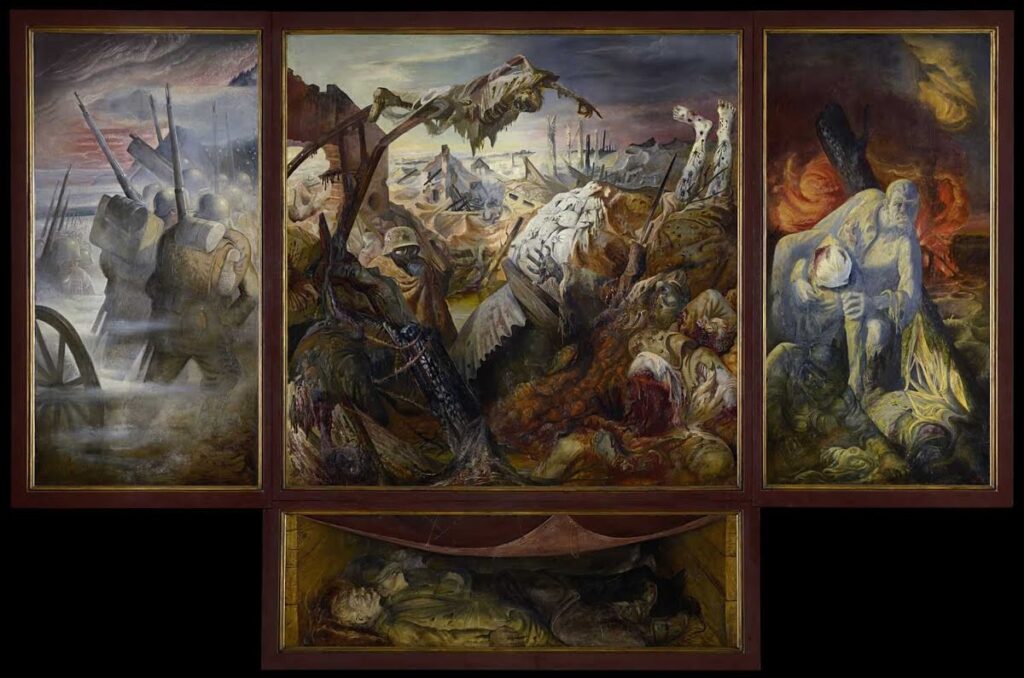 Introduction
Introduction
There is no doubt that World War I (1914 – 1918) was one of the most significant and devastating events in human history. Its unprecedented scale of destruction and loss left a lasting mark on human memory and the cultural landscape of the early twentieth century; marking the beginning of a period of disillusionment, skepticism, and existential reflection. To draw an analogy, when the body and mind endure traumatic experiences, such as illness, accidents, or despair, recovery is rarely complete. Physical wounds may heal, leaving scars as a reminder of the event. Nevertheless, psychological scars can persist, reshaping behavior, perception, and one’s own identity. These effects often require years, even generations, to mitigate and heal. Meanwhile, they find expression in different ways. In this case, the devastation of World War I was expressed through music, literature, poetry, and art.
In this paper, I will examine how World War I influenced European attitudes toward humanity while it transformed Europe’s cultural and artistic landscape. I will focus mainly on literature and art. To illustrate this shift, I have specifically chosen Erich Maria Remarque’s novel All Quiet on the Western Front; the artworks of Otto Dix; and the historical and cultural studies of Paul Fussell. It should be noted that other prominent works and authors also reflected this shift. However, Remarque, Dix, and Fussell, through their works, highlight in a very singular way the erosion of nationalist ideals, alienation, and disillusionment that persisted after the bloodshed on the respective war fronts.
Chapter I
Literature
«The war has ruined us for everything»[i].
Erich Maria Remarque
Erich Maria Remarque, one of Germany’s most prominent twentieth-century authors, gained lasting renown for his seminal novel All Quiet on the Western Front (1928), which vividly portrays the horrors of World War I and critiques nationalism and militarism. Born on June 22, 1898, in Osnabrück, Germany, into a modest Roman Catholic family, Remarque developed a love for literature through his father, a bookbinder, and began writing in his youth. Drafted into the German army at eighteen, his experiences on the Western Front in 1917 profoundly shaped his worldview, leading to the creation of his masterpiece, Im Westen Nichts Neues. The novel’s stark depiction of trench warfare earned international acclaim. However, it was criticized by German nationalists, leading to its banning and burning by the Nazis in 1933, which forced Remarque into exile in the United States and Switzerland. He passed away on September 25, 1970, in Locarno, Switzerland, at the age of 72.
Disillusionment in Literature
All Quiet on the Western Front (1928) captures in a magnificent way the devastating impact of World War I on the human psyche. The novel’s plot follows Paul Bäumer, a young German soldier whose initial patriotic zeal is crushed by the brutal realities of trench warfare. Remarque’s raw depiction of the front lines marked by hunger, sickness, and constant death underscores the meaninglessness of war and the loss of youthful idealism. For instance, Paul’s reflection: «I am young, I am twenty years old; yet I know nothing of life but despair, death, fear, and fatuous superficiality cast over an abyss of sorrow»[ii]. This statement practically encapsulates the destruction of pre-war optimism and the sense of alienation among soldiers.
The novel also attacks nationalist rhetoric that fueled the war. For example, Paul encounters a French soldier whom he kills in a shell-hole. However, Paul, in lieu of feeling proud of killing the enemy, says a revealing line: «But now, for the first time, I see you are a man like me… Forgive me, comrade; how could you be my enemy?»[iii]. This moment expresses a shift toward questioning nationalistic ideals, as the war’s scale prompted skepticism about social and religious values. Furthermore, Remarque’s visceral imagery and descriptions, such as the following one, contrast with pre-war romanticized views of war at the beginning of the novel: «Bombardment, barrage, curtain-fire, mines, gas, tanks, machine-guns, hand-grenades—words, words, words, but they hold the horror of the world»[iv].
Nevertheless, the clever moment that underscores this disillusionment occurs at the novel’s conclusion. Paul, the protagonist, after witnessing the tragic death of his fellow soldiers and friends, is overwhelmed by a sense of despair and alienation. Despite special permission to go back home, he finds that he is incapable of having a relationship with those untouched by war’s horrors. Hopeless, he comes back to the Western Front, and before the armistice, Paul is killed. Sadly, his death was reported with stark brevity in a military dispatch, only by noting the day that was otherwise unremarkable. «The army report confined itself to the single sentence: All quiet on the Western Front»[v].
Chapter II
Art
«We were eighteen and had begun to love life and the world; and we had to shoot it to pieces»[vi].
Otto Dix
Wilhelm Heinrich Otto Dix gained significant recognition for his distinctive depictions of World War I, employing Expressionism and Neue Sachlichkeit to critique militarism and social decay in Germany. He was born on December 2, 1891, in Untermhaus, Germany, to a working-class family. He developed an early interest in art, nurtured by his education at the Dresden School of Arts and Crafts. He was drafted into the German army in 1914, serving as a machine gunner on both the Western and Eastern Fronts. These experiences shaped his artistic visions and were later portrayed in artworks such as his series titled Der Krieg (The War, 1924). Like Remarque, Dix’s art provoked strong opposition from nationalist circles, resulting in his works being labeled degenerate and, as a result, banned. He died on July 25, 1969, in Singen, Germany, at the age of 77.
Trauma and Art
In the same way that World War I transformed literature, the visual arts suffered a similar transformation. Artists, most of them veterans, channeled their wartime experiences into works that rejected romanticized depictions of warfare. In Der Krieg (The War), Dix portrays the horrors of trench warfare. For instance, at the left, the beholder observes a group of German stormtroopers under a gas attack while they try to advance through an isolated landscape. In the middle, Dix presents the so-called The Trench. This part of the triptych depicts a nightmarish scene of bodies in a muddy German trench, which was so provocative that it was censored years later by nationalistic circles. Through his art, Dix not only documented his own physical experiences but also the trauma that thousands and thousands of soldiers faced in trench warfare. Furthermore, Der Krieg is an articulation of the collective anxiety and skepticism that defines post-war Europe. The battlefield portrayed by Dix has no space for nationalistic ideas, idealized war stories, or romanticized heroes. In other words, «Mankind is a zoological expression, or an empty word»[vii].
Chapter III
Cultural Shifts
«Every war is ironic because every war is worse than expected. Every war constitutes an irony of situation because its means are so melodramatically disproportionate to its presumed ends»[viii].
Paul Fussell
Paul Fussell, one of America’s most distinguished literary and cultural historians, was born into an affluent family on March 22, 1924, in Pasadena, California. He studied at Pomona College and Harvard University. Drafted into the U.S. Army in 1943, his experiences as an infantryman shaped his critical perspective of war. His magnum opus is The Great War and Modern Memory (1975), which earned international recognition for its unique exploration of how the Second World War shattered romantic ideals, and it was also criticized in more traditionalist militarist circles. As a prolific scholar, he taught at institutions such as the University of Pennsylvania and authored works including Abroad (1980) and Wartime (1989). He passed away on March 23, 2012, in Medford, Oregon, at the age of 88.
Loss of Innocence and Isolation
While Remarque employs a distinctive literary style to convey his experiences, attitudes, and insights, and to critique pre-war ideals, Fussell, as a cultural historian, utilizes the psychological and social sciences to express the erosion of innocence and the fostering of isolation following the Great War. As noted in Fussell’s biography, he did not participate in World War I. Nevertheless, his exhaustive work is remarkably comprehensive, featuring a vast number of testimonies and studies. In this work, Fussell articulates how the war dismantled pre-war optimism, replacing it with a grim awareness of human fragility and societal disconnection. The loss of innocence is captured in the testimonies analyzed by Fussell. Initially, the author presents romanticized views of war, which are later shattered by the brutal realities of trench warfare. He mentions, «The war…was a hideous embarrassment to the prevailing Meliorist myth which had dominated the public consciousness for a century»[ix]. This myth of progress, fostered by nationalistic propaganda, promised a noble and heroic conflict. However, at the end of the day, it crumbled as young soldiers encountered the bloody slaughter of the Western Front, leaving them disillusioned and stripped of their ideals. In other words, hopeless.
Additionally, life in the trenches stripped the recruits of their innocence. Soldiers found themselves estranged from both civilian society and their former selves. Fussell describes how the trench experience created a physiological trauma: «The trench…was a place of ritualized waiting, where one was isolated from the world above»[x]. But it was not only the mere experience that affected the soldiers, but also the inability to express their traumas. Highlighting this fact, Fussell quotes a soldier’s lament: «How can I put into words what I have seen and felt? It is impossible»[xi]. Moreover, World War I was a mechanized conflict with new armaments such as machine guns, flamethrowers, poison gas, and tanks, which effectively reduced soldiers to mere cogs.
Conclusion
World War I transformed European attitudes toward humanity, eroding pre-war optimism, nationalism, and romanticized ideals, in turn fostering a pervasive sense of disillusionment, skepticism, and existential reflection. The works of Erich Maria Remarque, Otto Dix, and Paul Fussell exemplify this shift. Remarque’s All Quiet on the Western Front captures the alienation and despair of soldiers stripped of their youthful ideals. At the same time, Dix’s Der Krieg visually articulates the trauma and futility of trench warfare through the stark Realist tradition of Neue Sachlichkeit imagery. Fussell’s The Great War and Modern Memory illuminates the broader cultural erosion of innocence of his era, revealing how the war dismantled myths of progress and heroism.
The scars of World War I extended far beyond the immediate post-war period, reshaping Europe’s cultural and philosophical trajectory. The disillusionment and existential questioning fostered by the Great War laid the groundwork for modernist movements in literature and art, which rejected traditional forms in favor of fragmented, introspective expression. Similarly, the skepticism toward authority and nationalism contributed to the rise of existentialist thought, as thinkers like Jean-Paul Sartre grappled with questions of meaning in a fractured world. These expressions served not only as a testament to the Great War’s devastation but also as a cautionary reflection on the cost of militarism and blind patriotism, urging future generations to seek a more humane path forward.
Bibliography
Encyclopedia Britannica, «Erich Maria Remarque», Chicago 2025, in https://academic.eb.com/levels/collegiate/article/Erich-Maria-Remarque/63148 (Referenced on April 22, 2025).
–––, «Otto Dix», Chicago 2025, in https://academic.eb.com/levels/collegiate/article/Otto-Dix/30700 (Referenced on April 22, 2025).
–––, «Paul Fussell Jr.», Chicago 2025, in https://academic.eb.com/levels/collegiate/article/Paul-Fussell-Jr/599328 (Referenced on April 22, 2025).
Remarque, E. M., All Quiet on the Western Front, Fawcett Crest, New York, United States of America 1975.
Fussell, P., The Great War and Modern Memory, Oxford University Press, United States of America 1975.
Ellmann, R. & Fiedelson, C., The Modern Tradition: Backgrounds of Modern Literature, Oxford University Press, New York, United States of America 1965.
[i] E. M. Remarque, All Quiet on the Western Front, Fawcett Crest, New York, United States of America 1975, 87.
[ii] Ibid., 263
[iii] Ibid., 223
[iv] Ibid., 132.
[v] Ibid., 296.
[vi] Ibid., 88.
[vii] R. Ellmann & C. Feidelson., The Modern Tradition: Backgrounds of Modern Literature, Oxford University Press, New York, United States of America 1965, 489.
[viii] P. Fussell, The Great War and Modern Memory, Oxford University Press, United States of America, 1975, 7.
[ix] Ibid., 8.
[x] Ibid., 36.
[xi] Ibid., 170.



